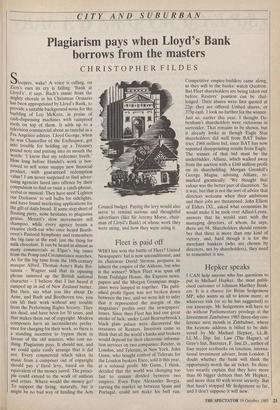CITY AND SUBURBAN
Plagiarism pays when Lloyd's Bank borrows from the masters
CHRISTOPHER FILDES
Sleepers, wake! A voice is calling, on Zion's ears its cry is falling: 'Bank at Lloyd's', it says. Bach's music from the mighty chorale in his Christmas Oratario has been appropriated by Lloyd's Bank, to provide a suitable background noise for the burbling of Leo McKern, in praise of cash-dispensing machines with rainproof roofs on top of them. It adds up to a television commercial about as tasteful as a Fra Angelico ashtray. Lloyd George, when he was Chancellor of the Exchequor, got into trouble for holding up a Treasury Pound note and putting into its mouth the words: 'I know that my redeemer liveth.' How long before Handel's work is bor- rowed to sell some snappy new financial Product, with guaranteed redemption value? I am never surprised to find adver- tising agencies lured into offence by their Compulsion to find or twist a catch-phrase, verbal or musical. They have used 'Lighten our Darkness' to sell bulbs for sidelights, and have found marketing applications for the gift of daily bread. If some stop short of flouting piety, none hesitates to plagiarise genius. Mozart's slow movements sell shampoo, while every agency boasts a creative cloth-ear who once heard Beeth- oven's Pastoral Symphony and remembers the big tune at the end: just the thing for milk chocolate. It can be heard in almost as many commercials as Eigar's big tunes from the Pomp and Circumstance marches. As for the big tune from the 18th-century masque Alfred, Thomas Arne's Rule Bri- tannia — Wagner said that its opening phrase summed up the British national character — I believe that I last heard it camped up in aid of New Zealand butter. But then, say what you like about Dr Arne, and Bach and Beethoven too, you can lift their work without any trouble from the Performing Rights Society. They are dead, and have been for 50 years, and that makes them out of copyright. Modern composers have an inconsiderate prefer- ence for charging for their work, so there is a standing incentive to bypass them in favour of the old masters, who cost no- thing. Plagiarism pays. It should not, and we could quite easily arrange that it did not. Every commercial which takes its music from a composer out of copyright should pay a' fixed levy, based on the equivalent of the money saved. The princi- ple could extend to the work of authors and artists. Where would the money go? To support the living, naturally, but it might be no bad way of funding the Arts
Council budget. Paying the levy would also serve to remind serious and thoughtful advertisers (like Sir Jeremy Morse, chair- man of Lloyd's Bank) of whose work they were using, and how they were using it.


















































 Previous page
Previous page